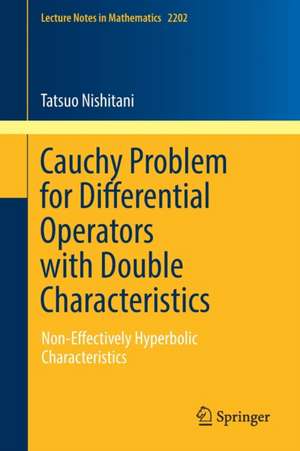Cauchy Problem for Differential Operators with Double Characteristics: Non-Effectively Hyperbolic Characteristics: Lecture Notes in Mathematics, cartea 2202
Autor Tatsuo Nishitanien Limba Engleză Paperback – 26 noi 2017
A doubly characteristic point of a differential operator P of order m (i.e. one where Pm = dPm = 0) is effectively hyperbolic if the Hamilton map FPm has real non-zero eigen values. When the characteristics are at most double and every double characteristic is effectively hyperbolic, the Cauchy problem for P can be solved for arbitrary lower order terms.
If there is a non-effectively hyperbolic characteristic, solvability requires the subprincipal symbol of P to lie between −Pµj and Pµj, where iµj are the positive imaginary eigenvalues of FPm . Moreover, if 0 is an eigenvalue of FPm with corresponding 4 × 4 Jordan block, the spectral structure of FPm is insufficient to determine whether the Cauchy problem is well-posed and the behavior of bicharacteristics near the doubly characteristic manifold plays a crucial role.
Din seria Lecture Notes in Mathematics
- 17%
 Preț: 360.43 lei
Preț: 360.43 lei -
 Preț: 459.92 lei
Preț: 459.92 lei -
 Preț: 121.41 lei
Preț: 121.41 lei -
 Preț: 175.68 lei
Preț: 175.68 lei -
 Preț: 197.00 lei
Preț: 197.00 lei -
 Preț: 279.76 lei
Preț: 279.76 lei -
 Preț: 477.66 lei
Preț: 477.66 lei - 17%
 Preț: 361.89 lei
Preț: 361.89 lei -
 Preț: 252.37 lei
Preț: 252.37 lei -
 Preț: 353.99 lei
Preț: 353.99 lei -
 Preț: 138.88 lei
Preț: 138.88 lei -
 Preț: 152.61 lei
Preț: 152.61 lei -
 Preț: 116.67 lei
Preț: 116.67 lei -
 Preț: 102.77 lei
Preț: 102.77 lei - 17%
 Preț: 365.53 lei
Preț: 365.53 lei -
 Preț: 396.76 lei
Preț: 396.76 lei - 17%
 Preț: 362.15 lei
Preț: 362.15 lei -
 Preț: 396.13 lei
Preț: 396.13 lei -
 Preț: 357.80 lei
Preț: 357.80 lei - 17%
 Preț: 362.31 lei
Preț: 362.31 lei -
 Preț: 403.81 lei
Preț: 403.81 lei - 17%
 Preț: 361.73 lei
Preț: 361.73 lei -
 Preț: 499.87 lei
Preț: 499.87 lei -
 Preț: 457.03 lei
Preț: 457.03 lei -
 Preț: 395.91 lei
Preț: 395.91 lei -
 Preț: 459.00 lei
Preț: 459.00 lei -
 Preț: 487.57 lei
Preț: 487.57 lei -
 Preț: 424.01 lei
Preț: 424.01 lei -
 Preț: 487.57 lei
Preț: 487.57 lei -
 Preț: 330.55 lei
Preț: 330.55 lei -
 Preț: 325.75 lei
Preț: 325.75 lei -
 Preț: 350.30 lei
Preț: 350.30 lei -
 Preț: 331.31 lei
Preț: 331.31 lei -
 Preț: 408.37 lei
Preț: 408.37 lei -
 Preț: 328.25 lei
Preț: 328.25 lei -
 Preț: 421.28 lei
Preț: 421.28 lei -
 Preț: 276.08 lei
Preț: 276.08 lei -
 Preț: 424.60 lei
Preț: 424.60 lei -
 Preț: 422.05 lei
Preț: 422.05 lei -
 Preț: 505.01 lei
Preț: 505.01 lei -
 Preț: 422.05 lei
Preț: 422.05 lei -
 Preț: 274.93 lei
Preț: 274.93 lei -
 Preț: 335.16 lei
Preț: 335.16 lei -
 Preț: 422.27 lei
Preț: 422.27 lei -
 Preț: 497.49 lei
Preț: 497.49 lei -
 Preț: 272.81 lei
Preț: 272.81 lei -
 Preț: 428.04 lei
Preț: 428.04 lei -
 Preț: 376.22 lei
Preț: 376.22 lei -
 Preț: 427.10 lei
Preț: 427.10 lei -
 Preț: 325.92 lei
Preț: 325.92 lei
Preț: 383.93 lei
Nou
Puncte Express: 576
Preț estimativ în valută:
73.49€ • 79.85$ • 61.77£
73.49€ • 79.85$ • 61.77£
Carte tipărită la comandă
Livrare economică 21 aprilie-05 mai
Preluare comenzi: 021 569.72.76
Specificații
ISBN-13: 9783319676111
ISBN-10: 3319676113
Pagini: 213
Ilustrații: VIII, 213 p. 7 illus.
Dimensiuni: 155 x 235 x 19 mm
Greutate: 0.32 kg
Ediția:1st ed. 2017
Editura: Springer International Publishing
Colecția Springer
Seria Lecture Notes in Mathematics
Locul publicării:Cham, Switzerland
ISBN-10: 3319676113
Pagini: 213
Ilustrații: VIII, 213 p. 7 illus.
Dimensiuni: 155 x 235 x 19 mm
Greutate: 0.32 kg
Ediția:1st ed. 2017
Editura: Springer International Publishing
Colecția Springer
Seria Lecture Notes in Mathematics
Locul publicării:Cham, Switzerland
Cuprins
1. Introduction.- 2 Non-effectively hyperbolic characteristics.- 3 Geometry of bicharacteristics.- 4 Microlocal energy estimates and well-posedness.- 5 Cauchy problem−no tangent bicharacteristics. - 6 Tangent bicharacteristics and ill-posedness.- 7 Cauchy problem in the Gevrey classes.- 8 Ill-posed Cauchy problem, revisited.- References.
Textul de pe ultima copertă
Combining geometrical and microlocal tools, this monograph gives detailed proofs of many well/ill-posed results related to the Cauchy problem for differential operators with non-effectively hyperbolic double characteristics. Previously scattered over numerous different publications, the results are presented from the viewpoint that the Hamilton map and the geometry of bicharacteristics completely characterizes the well/ill-posedness of the Cauchy problem.
A doubly characteristic point of a differential operator P of order m (i.e. one where Pm = dPm = 0) is effectively hyperbolic if the Hamilton map FPm has real non-zero eigenvalues. When the characteristics are at most double and every double characteristic is effectively hyperbolic, the Cauchy problem for P can be solved for arbitrary lower order terms.
If there is a non-effectively hyperbolic characteristic, solvability requires the subprincipal symbol of P to lie between −Pµj and P µj , where iµj are the positive imaginary eigenvalues of FPm . Moreover, if 0 is an eigenvalue of FPm with corresponding 4 × 4 Jordan block, the spectral structure of FPm is insufficient to determine whether the Cauchy problem is well-posed and the behavior of bicharacteristics near the doubly characteristic manifold plays a crucial role.
Caracteristici
Features thorough discussions on well/ill-posedness of the Cauchy problem for di?erential operators with double characteristics of non-e?ectively hyperbolic type Takes a uni?ed approach combining geometrical and microlocal tools Adopts the viewpoint that the Hamilton map and the geometry of bicharacteristics characterizes the well/ill-posedness of the Cauchy problem
